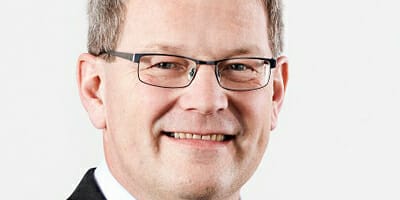Affluent small European nations such as Denmark easily count among the world’s most outward-looking places, and DKK 95-billion ($16.4-billion) investor Unipension clearly casts its eyes far and wide from its headquarters in suburban Copenhagen.
While nearly all investors look for some exposure in the world’s key markets, Unipension has enhanced its international focus by actively eliminating home bias in spaces where others dare not. The investor – which controls three labour-related pension funds – recently decided to sell its entire Danish property holdings and invest the proceeds in international real estate funds.
A fully international approach is a bold move in an asset class that most investors are more comfortable in close to home. To Niels Erik Petersen, Unipension’s chief investment officer, it was a logical step for the investor.
“In all our investments we have a core-satellite international diversification strategy, but in real estate we only had Danish exposure so we wanted to diversify here as well,” Petersen says. The move, which will also see real estate allocations harmonised at 5 per cent across the three funds Unipension controls, will concentrate primarily on the United States and Western Europe.
Just 5 per cent of Unipension’s liquid portfolio (incorporating all assets excluding real estate) is invested in Danish equities, and Petersen says the fund has tried to avoid a home bias in this asset class as well.
“Denmark has a very small market, so there are a lot of opportunities outside of our region that help us balance the risk of our portfolio,” he explains. Petersen points out though that the international focus should not be interpreted as an abandonment of the investor’s homeland though, with the smooth functioning of Danish capital markets a key focus of Unipension’s active ownership strategy.
Careful global approach
“Diversification is important on our fixed income side, but what’s also important is that you get your money back,” says Petersen. Danish government bonds and high quality Danish mortgage bonds are therefore a significant part of the 39-per-cent gilt-edge-bond portfolio. Other “core” European government paper from the likes of Germany and Holland occupy the rest of that position.
Despite being an international fund, Unipension naturally has no desire to be impacted by regional pitfalls, and it therefore divested from southern European government bonds in 2009.
Petersen reveals that an unintentionally off-putting research trip led to Unipension moving away from the continent’s more indebted government bonds well before most other European investors followed. He was part of a group that met with a number of figures in Athens a few years ago with the firm intention to increase Unipension’s holding of Greek debt.
Discovering the true extent of the crisis conversely led Unipension to quickly drop its holdings in not only Greek but also Spanish, Italian and Portuguese government debt – a call that looks inspired in hindsight.
A dependence on external managers for Unipension’s vast emerging market portfolio (11 per cent of liquid assets are in emerging market debt and 29 per cent in overseas equities) means no such research is necessary in this space. The emerging market debt holdings have increased in recent years at the expense of gilt-edged bonds, with equity holdings also increasing gradually due to their strong performance.
A 12-per-cent allocation to high yield in the liquid portfolio “has been useful” says Petersen, who indicated Unipension had no doubts about the assets despite high yield investors suffering in this summer’s market turbulence.
Again Unipension appeared to have timed its tactical approach well with a move down from an overweight position on high yield being made in 2012. This was definitely “not a macro call”, Petersen points out though, as the fund simply saw better protection in loans.
Thin pickings lead to alternatives
Petersen explains that implementing a “duration overlay” had been a key strategic change in the recent past in an effort to extend the duration of assets to match liabilities, but this was reversed last year. “
Everything is pointing to a scenario of low returns in the coming years,” he says, betraying an outlook marked by pessimism. The investment head does not expect a “tremendous” performance in equities. Low interest rates also make the prospect poor for bonds in his view.
A natural consequence of that grim view would seemingly be for Unipension to diversify its asset base as much as it has its geographic spread. Petersen confirms this process is well under way with a private equity portfolio being launched in recent years and since increased to 4 per cent of liquid assets.
“We will increase our private equity holdings further, no doubt about it,” he says. The private equity bucket has a US-tilt, while Unipension has discovered a liking for secondary holdings.
The investor could well join other Danish pension funds in making major attempts to develop infrastructure investments, according to Peterson. Unipension’s limited and relatively short liabilities make this less of a pressing need, although it has already looked at various potential projects.
Strong returns in the last few years perhaps make it easier for Petersen to express his fears for the future. Unipension has gained accumulated returns of over 74 per cent since the start of 2009, which is some 14 per cent higher than its benchmark. In 2012 it booked an annual return of over 13 per cent but there has been a noticeable slowdown in 2013, with returns of just under 3 per cent for the first half of the year.
Free but prudent
The trio of funds under Unipension’s control run nearly identical asset strategies, Petersen says, with a system of modulised mutual funds ensuring assets are efficiently pooled. Slight liability differences and risk appetite variations at the three respective boards require some fine tuning though, he adds.
As liabilities are guaranteed on a contingent basis (Unipension promises to deliver at least 1 per cent per year but has a get-out clause if returns fall below that), Petersen says the investor “has a large degree of investment freedom and we can really go for long-term returns”. That allows Unipension a bigger risk budget than its Danish counterparts, although in true conservative Scandinavian tradition, Petersen says the fund has actually kept its risk “very low” under its international diversification drive.
The global outlook of Danes has created a problem for Unipension in that it has found itself under fire at home, along with other pension funds, for emerging market debt investments.
They have been criticised on the basis that the investments might support undesirable regimes. Petersen explains that Unipension carefully follows guidelines and is willing to avoid any investment it deems irresponsible.
“We are here to invest and not make foreign policy, but we do like to invest on an ethically sound basis”, says Petersen, who calls for international guidelines to be developed to make sustainable emerging market debt investments easier.
Unipension includes environmental, social and governance experts on its central investment decision-making organs, and Petersen himself is a respected figure of the sustainable investing scene as member of the United Nations-backed Principles for Responsible Investment Advisory Council. He is pleased to have a leading role in a movement that he deems is gaining increasing importance. “Responsible investing is perceived a lot differently than it was 10 years ago,” he points out.



